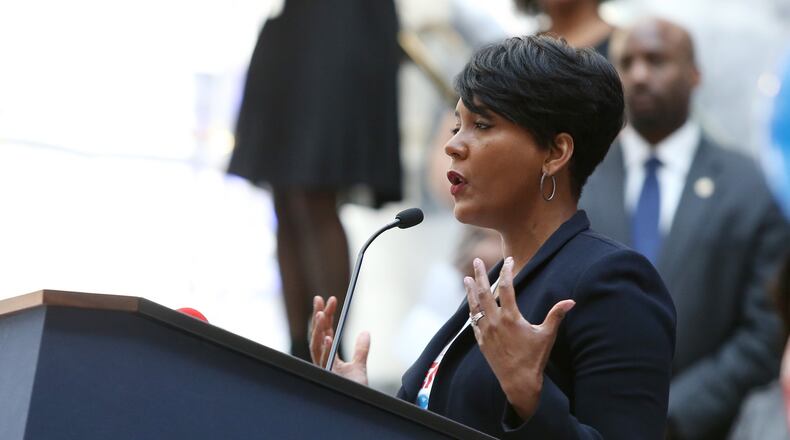Atlanta has identified 14,805 additional addresses and corrected or updated 64,421 others since the last census, meaning the municipality could gain $100 million in additional federal funding and more political muscle after the 2020 population tally, city officials said Monday.
“This is such an important day. Obviously, it is April 1, but the census is no joke,” Mayor Keisha Lance Bottoms told dozens of people who gathered at City Hall for an energetic, balloon-filled rally about the decennial count. “And we are so very far ahead in the city of Atlanta.”
City officials made the discoveries last year after comparing their records to the U.S. Census Bureau’s address lists. They did the work through a federal program called Local Update of Census Addresses Operation.
Among the new addresses identified are recently constructed homes and apartment buildings. Officials also found missing apartment numbers, corrected erroneous addresses and confirmed people are living in houses previously deemed unoccupied. The bureau will seek to confirm Atlanta’s findings this year, said George Grandy Jr., the federal agency’s Atlanta regional director, who also spoke at Monday’s rally.
Gaining more political power could help Atlanta in the state Legislature, especially when it comes to the proposed state takeover of Hartsfield-Jackson Atlanta International Airport, an idea vehemently opposed by the city.
“When we think about the takeover – or what they think they are going to do with our airport — we know that we need more voices representing the city of Atlanta down at the Capitol,” said state Sen. Nikema Williams, D-Atlanta, who also spoke.
City officials are hoping for good news after the 2010 census resulted in a population count that shockingly fell 22 percent below the bureau’s 2009 estimate, from 541,000 to 420,000.
RELATED: Census shock result of flawed estimates
The mayor held Monday’s news conference to introduce “ATL Counts,” a year-long effort to encourage participation in the 2020 census. U.S. Rep. John Lewis, D-Atlanta, will help the mayor lead the effort. Dozens of other elected officials, community leaders and others are serving on the city’s Complete Count Committee. In 2017, the city approved $1 million to help with the effort.
Georgia launched a similar effort in 2017, when then-Gov. Nathan Deal appointed the Governor's Complete Count Committee. And last month, Stacey Abrams announced a nonprofit group designed to ensure that hard-to-count populations are tallied.
Mandated by the U.S. Constitution, the census is a once-a-decade count of the nation’s population, now estimated at 328 million. There is a lot at stake: The results are used to help determine the number of seats for each state in the U.S. House of Representatives and to draw congressional and state legislative districts. Georgia, for example, picked up a 14th House seat after the 2010 census.
Federal agencies distribute more than $675 billion in federal funds to states and communities each year based on census figures. Communities use the data to plan road construction, as well as schools and emergency services. Businesses use it to figure out where to open shops.
For the 2020 count, all households will have the option to respond to the census online, over the phone or by mail. The questionnaire will ask about age; sex; Hispanic, Latino or Spanish origin; race; how people are related and if their homes are owned or rented.
The U.S. Supreme Court is expected to decide by June whether the questionnaire should also ask whether people are U.S. citizens. The Trump administration says doing so would help it enforce the federal Voting Rights Act of 1965. Critics say it could substantially depress Census participation by unauthorized immigrants and hurt the accuracy of the count.
The bureau, meanwhile, is emphasizing that it does not share personal census records with federal immigration authorities or allow them to be used to determine a person’s government benefits.
“Data literally shape the future of your community,” Census Bureau Director Steven Dillingham said in a prepared statement Monday, also known as Census Day. “That’s why it’s so important that everyone understands that responding to the 2020 Census is safe, easy and important.”
Why it matters
Census results help determine the number of seats for each state in the U.S. House of Representatives and the boundaries of congressional and state legislative districts. The government uses the data to distribute more than $675 billion annually in federal funds to states and communities.
About the Author
Keep Reading
The Latest
Featured




